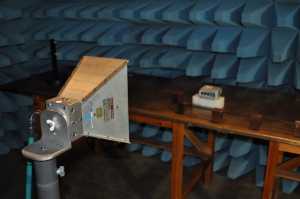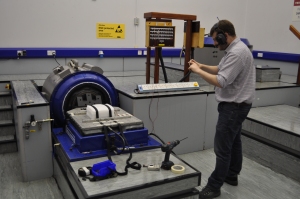Before the European Space Agency and NASA allow Astro Pi on board the International Space Station, certain tests have to be carried out to ensure the safety of the station, and its crew.
These tests are being done by SSTL, the Raspberry Pi foundation, and Airbus Defence and Space.
Here at Airbus DS in Portsmouth we have a dedicated facility to test the equipment that we manufacture for our satellites.
This test facility is being used to undertake testing of Astro Pi for shock, vibration, and EMC.
Shock and Vibration
For these tests, we strapped an non-powered Astro Pi, in its aluminium case and a representative foam container to a vibration table. When Astro Pi flies on the Soyuz rocket later this year with UK ESA Astronaut Tim Peake, it will be stowed inside the pressurized module, in foam packaging and a nomex bag.
Using the vibration table we simulated the transport, launch, orbital flight and docking of the Astro Pi, when flown on a Soyuz rocket, in accordance with a specification from the rocket manufacturer. These tests are not flight safety critical, as the Astro Pi is a passive passenger, but it ensures that when they arrive at the ISS they are in working state for Tim Peake to run the submitted experiments.
Dave Honess, from Raspberry Pi watching Astro Pi Flight Qual 1 mounted on a vibration table.
For the insertion phase (launch) and orbital flight, multiple shock tests were carried out at 40G, for 3ms, on each axis, as well as more sustained tests simulating the random vibration during ascent into orbit.
The random vibration test, at peak level was 2500, 8G shocks spread over 5 minutes.
After each test the Astro Pi was unpacked and tested, using some specially written code. Functionality of all the sensors, the camera and GPIO buttons were checked for correct operation. Astro Pi performed flawlessly.
EMC Testing
Astro Pi EMC testing falls into two categories, Radiated Emissions and Radiated Susceptibility.
Radiated Emissio n testing checks that when the Astro Pi is operating, it will not interfere with the Space Station’s systems. We don’t want Tim to start an experiment, and cause a radio blackout, or influence the Stations orbit, for instance. We are also checking that communication frequencies used in an emergency are not blocked by a normally functioning Astro Pi. The test band and specific frequencies are specified to us in a European Space Agency document. Luckily the team at The Raspberry Pi Foundation have designed a special aluminium case, which has the effect of blocking most radio waves produced by the Astro Pi.
n testing checks that when the Astro Pi is operating, it will not interfere with the Space Station’s systems. We don’t want Tim to start an experiment, and cause a radio blackout, or influence the Stations orbit, for instance. We are also checking that communication frequencies used in an emergency are not blocked by a normally functioning Astro Pi. The test band and specific frequencies are specified to us in a European Space Agency document. Luckily the team at The Raspberry Pi Foundation have designed a special aluminium case, which has the effect of blocking most radio waves produced by the Astro Pi.
This horn antenna is picking up emissions above 1GHz from the Astro Pi, and passing them to a spectrum analyzer outside the chamber. It is OK for Astro Pi to be radiating, but the levels must be below a threshold set by ESA.
Radiated Susceptibility
Here we expose the Astro Pi to modulated radio waves, across a spectrum of frequencies, while looking for any deviation from normal operation. This could be a reset, spurious readings from a sensor, or a unrecoverable software error. This test will give us confidence that the Astro Pi will not pass any problems into the ISS power system (the only connection from Astro Pi to ISS is for 5V power). It also give us confidence that the submitted experiments will be performed properly, and you will all get useful results.
Other tests to be performed before flight are, off-gassing (a check of chemicals released by Astro Pi when exposed to vacuum), flammability assessment, and operation when powered from a crew laptop.
Follow Astro Pi on twitter @Astro_pi for more updates, and I hope this has been some help!
Myself, and one of the Airbus DS Apprentices, who is training to be an EMC test Engineer!


Nice coverage and news. This information being public is awesome, thanks John!!
LikeLike
Hi John,
Thanks for posting this story. It must be a lot of fun.
It just happened to post a question on radiation test for the Raspberry PI on its general forum. I would be curious to know how many krad you think the board will handle.
Are you planning to do this test?
Will you release a formal report of these tests?
Thanks a lot!
Nicolas
LikeLike
Hi Nicolas. These test are electromagnetic radiation, not radiation in the krad sense.
LikeLike
[…] spirits in places I could only dream of. Really counting my lucky stars on this one. Doing the shock, vibration and EMC tests in Portsmouth on the flight Astro Pi units was very special, even if it meant long hours grovelling […]
LikeLike
Hi John,
I am working on a small spacecraft research project and we are looking at potentially using the Raspberry Pi as the on-board computer.
Have additional tests been performed? If so, what are the results?
Thanks,
Dan
LikeLike
The tests we did wee to satisfy ESA and NASA that the Astro Pi is safe for use in the pressurised environment of the ISS. What are your requirements? John
LikeLike